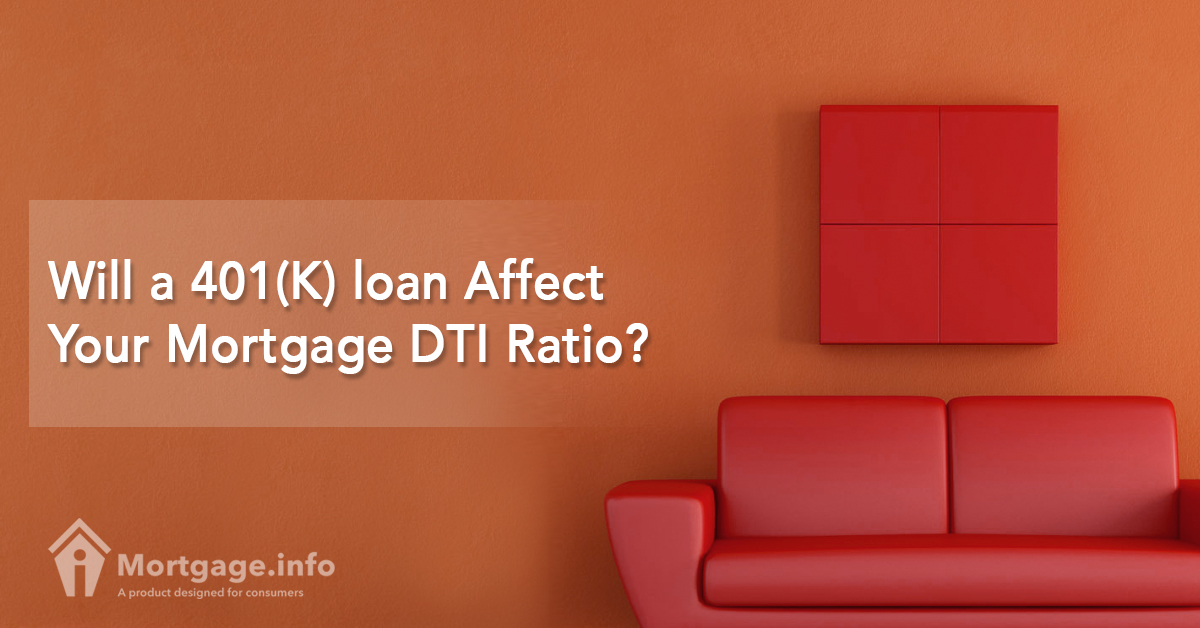One of the hardest parts about buying a house is saving up for the down payment. Even when you have enough for the down payment, you have to consider the closing costs. Generally, closing costs span between 2 and 5 percent of the purchase price of the home. On a $200,000 home, this is as much as $10,000 in closing costs. If you are short on cash, but have a hefty 401(K) account, you might consider taking out a 401(K) loan. Of course, then you have to worry about your debt-to-income ratio. Any new debt often increases your debt ratio; however, a loan from your 401(K) typically does not affect your DTI.
How a 401(K) Loan Works
First, let’s look at how you can borrow from a 401(K). If you contribute to your retirement account every time you get paid, you may have quite a bit saved for your golden years. If your employer matches your contributions, you are in even better position for retirement. What happens when you want to tap into those funds though? The good news is that many companies allow you to have access to your funds for certain reasons. One of those reasons is usually to purchase a home. You must be fully vested in your account, though. This means that you held the account for the specific amount of time the company deemed necessary. Let’s say your company requires you to contribute for 5 years before you are fully vested. After 5 years, you are able to take out a loan worth up to 50% of the value of your account, according to the law.
Every company differs on the terms of the 401(K) loan, just like every lender differs on mortgage terms. You can typically expect to pay lower than average interest rates and have a short term. Most companies require you to pay the 401(K) back within 5 years. Essentially, though, you are paying yourself back, so it is not as hard of a pill to swallow.
Before you can take out a loan on your 401(K) though, you will probably have to secure approval from the HR administrator at your company. They have to make sure you are using the funds for an approved purpose. In order to prove you need the funds to purchase a home, you can simply supply the purchase contract. This is usually enough to gain approval.
Tell Your Lender
Don’t try to hide the fact that you took out a 401(K) loan from your mortgage lender, though. They will find out one way or another. If you use the funds for the down payment on your home, the lender will need to source the funds. This means they need to find out where the funds came from. If it is obvious it is more money than you make at your job, the lender will need proof of the fund’s origination. They do this in order to ensure that you did not take out a loan that you need to repay. This means a loan from a bank or even a person that you need to repay. A loan from your 401(K) does not count against your DTI.
As a part of the process, your lender will need to see a paper trail following the funds. In this case, they need proof of receipt of the funds from your 401(K) and then proof of the funds being deposited in your bank account. Every transaction needs a receipt, which you can give to the lender.
Why a 401(K) Loan Doesn’t Affect Your DTI
It might seem confusing to think that your 401(K) loan does not affect your DTI. After all, it is a loan, right? Essentially, it is not a loan. You are only paying yourself back. You borrowed the funds from your future self, so to speak. The funds were there to help you in retirement. Since you needed them now, you took them out, but promised to repay the funds within a 5-year period (or whatever term your company requires). You are not paying back a creditor – the money simply exchanged places for you temporarily.
Watch the Penalties
Before you jump in and take money out of your 401(K) for a down payment, make sure you inquire about the penalties. Generally, there are no fees you must pay to borrow from your own funds. However, if you do not repay the loan as you agreed to, you may pay penalties. In some cases, you could pay as much as 10% of the amount you withdrew and be liable to pay income taxes on the money you took out. Always make sure you are capable of making the payments on time before you take money out of your retirement account.
Whether or not it is a good idea to take a 401(K) loan to put money down on a home is up for debate. If the market is not doing very well right now, you could do yourself a favor by borrowing the money. This way it no longer sits in the market and cannot fluctuate. However, if the market is doing well and you withdraw the money, you could miss out on dividends and interest you would have made if you left the money in the account.
The bottom line is you need to talk to your personal accountant to decide what is right for you. If you can afford the mortgage you would receive on the home as well as the payments to pay back the 401(K) loan, then you may find it suitable to borrow the money. If you are unsure about your ability to pay either loan back, it might not be the right choice. As always, shop around with several lenders to find the right mortgage program for you. This way you can make your mortgage as affordable as possible while you pay your retirement account back without incurring any penalties or fines.

